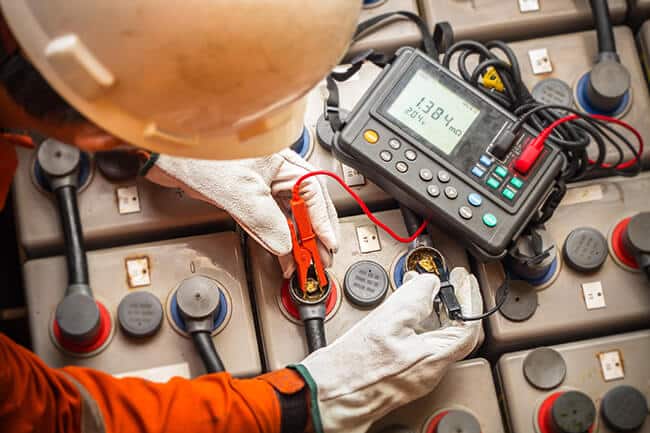20 Points To Consider For Handling and Taking Care of Batteries On Ships
Batteries are used in almost every important equipment onboard ships, and yet not much attention is paid for their care and handling. This topic is specifically important for the ship’s Safety Officer onboard. Hazards such as explosions that occur during charging of batteries mainly occur due to hydrogen as well as short circuits.
When a battery is being charged, it gives off hydrogen and oxygen and the mixture that is formed subsequently can be easily ignited.
Short circuits pose the danger of arcing, which can cause an explosion or even burn the operator.
The following are the general precautions which must be adhered to for all batteries:
1. Compartments in which batteries are kept should be well ventilated to prevent any buildup of dangerous and flammable toxic gases.
2. A conspicuous label stating “No Smoking/No Naked Lights” should be displayed on the outside of the door leading into the compartment as well as inside the compartment so that the personnel makes no mistakes

3. The compartment for the storage of batteries should be strictly used for the purpose of storing batteries and nothing else. For example, other pieces of lights and scraps such as NUC or RAM lights must not be lying around
4. The light bulbs in the compartment must be protected by gas tight enclosures and all the wiring leading into the lights must be well insulated and not a messy bunch
5. All battery connections must be clean and neat and tight
6. Batteries must be securely stowed in their position
7. Metal tools must be squared up and not left lying on top of the batteries as they may lead to short circuits
8. Because the presence of metals in contact with batteries might lead to a mishap, rings should not be worn by personnel when working with batteries as they may cause burns
9. Whenever the batteries are moved, especially really big ones, they should be carried horizontally. In case of really heavy battery, sufficient personnel must be assigned for the carriage of the same. The liquid solution within the batteries might cause corrosive injuries and even damage the clothing, hence utmost care while handling them is important

10. The circuits formed by the batteries must be dead/inactive when leads are being connected or disconnected. A live battery can cause a live wire which can lead to serious injuries
11. The battery compartment must be kept locked to prevent inadvertent use and the key safely placed in a box outside
12. Portable electrical instruments must be avoided or not used at all in such compartments
When handling lead acid batteries
13. When handling lead batteries, it must be kept in mind that they are hygroscopic, i.e., they have an affinity to water. When preparing an electrolyte, the acid should be gradually added to water. If the handler chooses to add water to the acid, it can cause heat to be generated in which case it might spill over and cause corrosive injuries or burns to the handler due to a sudden spray of sulphuric acid

14. Personal protective clothing such as goggles, rubber gloves, appropriate boiler suits must be worn when handling batteries
15. The positive and the negative terminals must be kept protected with vaseline to prevent deposits on them which reduces the efficiency of the battery in general
16. An excessive charging rate must not be used because it might result in an acid mist coming out of the battery vents which can cause burns to the skin or irritation to the eyes
17. In case of a mishap, the affected area must be cleaned with copious amounts of water to wash out all residues. Eyewash containers and a container of fresh water must be kept handy for sudden use
When handling alkaline batteries
18. The metal cases of these batteries are ‘live’ and should not be touched with the body or tools
19. The electrolyte is corrosive and in the event of a mishap it should be neutralised with boric acid powder or by large amounts of fresh water. Eyes should be washed with fresh water and then washed with boric acid solution.
20. Alkaline and lead acid batteries must not be stowed in the same compartment. Each and every tool used for the workings of one battery must be thoroughly cleaned before using it on another type of battery.
With regular usage of batteries onboard ships, we often forget the care and precautions that need to go with it. While it might seem irrelevant, they do pose a considerable chance of danger if not handled properly. It is better to be safe than sorry onboard ships so with a little bit of care and diligence, a great many accidents can be avoided with regard to all kinds of batteries.
Disclaimer: The authors’ views expressed in this article do not necessarily reflect the views of Marine Insight. Data and charts, if used, in the article have been sourced from available information and have not been authenticated by any statutory authority. The author and Marine Insight do not claim it to be accurate nor accept any responsibility for the same. The views constitute only the opinions and do not constitute any guidelines or recommendation on any course of action to be followed by the reader.
The article or images cannot be reproduced, copied, shared or used in any form without the permission of the author and Marine Insight.
Latest Shipboard Guidelines Articles You Would Like:
Do you have info to share with us ? Suggest a correction

About Author
Shilavadra Bhattacharjee is a shipbroker with a background in commercial operations after having sailed onboard as a Third Officer. His interests primarily lie in the energy sector, books and travelling.
Subscribe To Our Newsletters
By subscribing, you agree to our Privacy Policy and may receive occasional deal communications; you can unsubscribe anytime.
Web Stories





















Just a couple of points that I thought of whilst casting my eyes over this on batteries:
1. Sometimes if a crew member has a ring or rings that cannot be removed, it is advisable to tape the ring. Care should also be taken with wrist watches, always best to remove them…………just another point on rings, it is probably not a good idea to wear them on board……..I have seen photographs oh some rather nasty injuries that have occurred to sailors wearing rings.
2. Regarding adding acid to lead/acid batteries, NEVER add acid unless some of the electrolyte has been spilled…….this is a battery manufacturer’s instruction……….and if you have your point is valid, re adding acid to a battery electrolyte.
oops!!
I left a word out in the the last sentence……..if you have “TO” your point is valid…….I omitted to
I appreciate your tip to look into keeping your batteries safe and ventilated. I also like how you said that if they are well ventilated, they won’t be in danger of having toxic gases inside. My husband is looking into industrial batteries, and I am trying to help him make sure that they are used and stored safely.